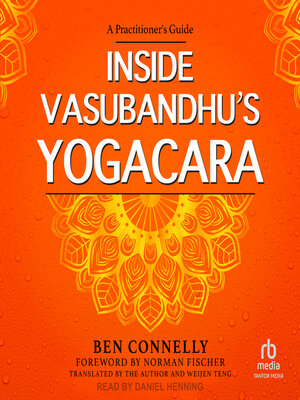
Sign up to save your library
With an OverDrive account, you can save your favorite libraries for at-a-glance information about availability. Find out more about OverDrive accounts.
Find this title in Libby, the library reading app by OverDrive.



Search for a digital library with this title
Title found at these libraries:
| Library Name | Distance |
|---|---|
| Loading... |
In this book, Ben Connelly guides us through the intricacies of Yogacara and the richness of the "Thirty Verses." His warm and wise voice unpacks and contextualizes its wisdom, showing us how we can apply its ancient insights to our own modern lives, to create a life of engaged peace, harmony, compassion, and joy.
In fourth-century India one of the great geniuses of Buddhism, Vasubandhu, sought to reconcile the diverse ideas and forms of Buddhism practiced at the time and demonstrate how they could be effectively integrated into a single system. This was the Yogacara movement, and it continues to have great influence in modern Tibetan and Zen Buddhism.
Vasubandhu's "Thirty Verses" lay out a path of practice that integrates the most powerful of Buddhism's psychological and mystical possibilities. Although Yogacara has a reputation for being extremely complex, the "Thirty Verses" distills the principles of these traditions to their most practical forms, and this book follows that sense of focus; it goes to the heart of the matter—how do we alleviate suffering through shedding our emotional knots and our sense of alienation?
This is a great introduction to a philosophy, a master, and a work whose influence reverberates throughout modern Buddhism.
In fourth-century India one of the great geniuses of Buddhism, Vasubandhu, sought to reconcile the diverse ideas and forms of Buddhism practiced at the time and demonstrate how they could be effectively integrated into a single system. This was the Yogacara movement, and it continues to have great influence in modern Tibetan and Zen Buddhism.
Vasubandhu's "Thirty Verses" lay out a path of practice that integrates the most powerful of Buddhism's psychological and mystical possibilities. Although Yogacara has a reputation for being extremely complex, the "Thirty Verses" distills the principles of these traditions to their most practical forms, and this book follows that sense of focus; it goes to the heart of the matter—how do we alleviate suffering through shedding our emotional knots and our sense of alienation?
This is a great introduction to a philosophy, a master, and a work whose influence reverberates throughout modern Buddhism.







